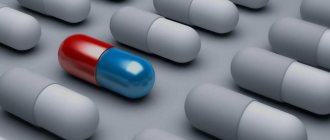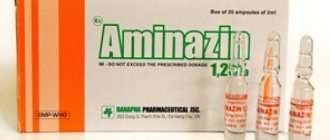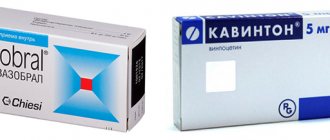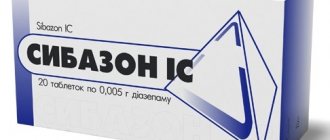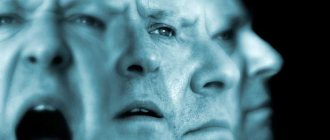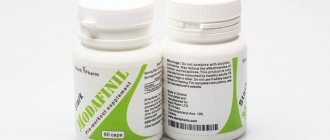Release form and composition
The drug is available in the form of an oral solution and hard gelatin capsules filled with grayish-brown granules or powder with a characteristic aromatic odor.
The active ingredient of Negrustin is a dry extract of St. John's wort, one capsule contains 425 mg, 1 ml of solution contains 791 mg.
The extract of St. John's wort contains:
- Anthracene derivatives (mainly hypericin and pseudohypericin);
- Xanthones;
- Flavonoids (quercetin, isoquercetin, rutin, hyperoside, amentoflavone);
- Oligomers;
- Acylchloroglucinols and, in particular, hyperforin (the active principle of the herb St. John's wort, which is responsible for the positive effects in the treatment of depressive conditions) and adhyperforin (in small quantities);
- Essential oils;
- Procyanides and other catechin tannins;
- Derivatives of caffeic acid (including chlorogenic acid), which are powerful antioxidants.
The following are used as auxiliary components in the production of capsules: microcrystalline cellulose, lactose monohydrate, calcium hydrogen phosphate dihydrate, colloidal silicon dioxide, magnesium stearate, talc.
Auxiliary components of Negrustin solution are glycerol, sorbitol 70%, propylene glycol and flavorings.
Negrustin
Release form, composition and packaging
Hard gelatin capsules, with a red matte body and a green matte cap; the contents of the capsules are grayish-brown granules with a characteristic aromatic odor.
1 caps. dry extract of St. John's wort herb (3.5-6.0: 1) 425 mg.
The solution for oral administration is clear, brown to red-brown in color with an aromatic odor; During storage, a slight sediment or cloudiness may form.
1 ml liquid extract of St. John's wort herb (0.7-1.3:1) 791 mg.
Excipients: glycerol, propylene glycol, sorbitol 70%, flavorings.
Clinical and pharmacological group: Herbal medicine with antidepressant activity.
pharmachologic effect
Herbal preparation with antidepressant activity. It has a beneficial effect on the functional state of the central and autonomic nervous system.
The main component of St. John's wort extract is hypericin. It is assumed that hypericin is capable of inhibiting the activity of MAO type A. Flavonoids included in the St. John's wort extract bind to benzodiazepine receptors and have a sedative effect.
When using the drug, mood improves, mental and physical performance increases, and sleep normalizes.
Pharmacokinetics
The effect of the drug Negrustin is the combined effect of its components, so kinetic observations are not possible; All together the components cannot be traced using markers and biostudies.
Indications
- mild to moderate depression;
- states of anxiety and restlessness;
- psychovegetative disorders.
Dosage regimen
For adults and children over 12 years of age, the drug is prescribed 1 capsule. 1-2 times/day or 1 ml of solution 3 times/day.
The course of treatment is 6-8 weeks. If necessary, repeated courses of treatment are possible.
Capsules should be taken with meals, without chewing and with sufficient liquid.
The solution can be taken undiluted or with a small amount of liquid during meals.
Side effect
From the digestive system: symptoms of dyspepsia.
Dermatological reactions: photosensitivity.
Other: allergic reactions.
Contraindications
- endogenous depression;
- history of photosensitivity to taking St. John's wort;
- hypersensitivity to the drug.
Pregnancy and lactation
Despite the lack of data on the harmful effects of the drug, taking Negrustin during pregnancy and lactation is possible only if the potential benefit to the mother outweighs the possible risk to the fetus or newborn.
special instructions
During the period of taking the drug, especially fair-skinned patients, should avoid prolonged exposure to sunlight and visiting solariums.
The simultaneous use of other drugs that cause photosensitivity should be avoided.
Due to the presence of sorbitol in the oral solution, it should be taken into account that with each dose of the drug, about 121 mg of sorbitol enters the body.
When prescribing an oral solution to patients with diabetes mellitus, it should be taken into account that 1 ml corresponds to 0.01 XE.
Caution should be exercised when prescribing the oral solution to patients with fructose intolerance.
It is not recommended to use Negrustin simultaneously with MAO inhibitors.
Use in pediatrics
The drug should not be prescribed to children under 12 years of age due to lack of sufficient data.
Impact on the ability to drive vehicles and operate machinery
The drug may affect the patient's psychophysical abilities, especially when taken simultaneously with tranquilizers or alcohol.
Overdose
To date, there is no data on cases of overdose of the drug Negrustin.
Symptoms: the described side effects may increase.
Treatment: if taking the drug in high doses, avoid exposure to the sun for 1-2 weeks.
Drug interactions
With simultaneous use of Negrustin with cyclosporine, indinavir, protease inhibitors, indirect anticoagulants (phenprocoumon, warfarin), digoxin, theophylline, amitriptyline, nortriptyline, the effect of Negrustin may be weakened.
When Negrustin is used simultaneously with other antidepressants (fluoxetine, paroxetine, sertraline, fluvoxamine, citalopram), side effects may increase (nausea, vomiting, fear, psychomotor agitation).
Concomitant use of photosensitizing drugs may lead to increased photosensitivity.
Concomitant use of oral contraceptives may lead to bleeding.
Storage conditions and periods
The drug should be stored at a temperature not exceeding 25°C. The shelf life of the capsules is 3 years. The shelf life of the solution is 4 years.
Indications for use
According to the instructions for Negrustin, the indications for use of the drug in capsule form are:
- Mild and moderately severe depressive states;
- Psychovegetative disorders;
- Conditions accompanied by increased anxiety and restlessness.
Negrustin solution is used to treat:
- Reactive and symptomatic depression;
- Sleep disorders;
- Anxiety disorders.
As an addition to the main therapy, the use of Negrustin is indicated for endogenous depression (especially those that occur during menopause), as well as for a number of diseases of the digestive tract (stomach, intestines), gall bladder, and lungs.
In addition, Negrustin solution can also be used externally:
- For muscle and joint pain;
- For herpes zoster;
- For hemorrhages;
- For disinfection of wounds.
Reviews of use for depression
The instructions for use of the drug warn that Negrustin is powerless against endogenous causes of depression. It is also undesirable to take it during periods of psychosis provoked by depressive states. This requires more serious pharmaceuticals (for example, benzidiazepine tranquilizers).
Reviews from doctors about Negrustin indicate that the drug can have a therapeutic effect for depression of any form at the initial stage of their development. If the condition has been tormenting the patient for years, and he has only recently consulted a doctor, SSRI antidepressants, antipsychotics, nootropics and, in some cases, mood stabilizers will be required. Negrustin can be combined with all these medications only with the approval of the treating psychiatrist.
Reviews from neurologists about Negrustin report that the drug has an excellent effect, first of all, on suspicious people prone to hypochondria. Particularly effective for the elderly and elderly in the treatment of mild neurological disorders.
Contraindications
According to the instructions for Negrustin, the use of the drug is contraindicated in:
- Endogenous depression (that is, one that does not depend on external factors, but is associated with a deficiency of neurotransmitters in the brain);
- Photosensitivity (hypersensitivity to ultraviolet rays) caused by taking St. John's wort (history);
- Hypersensitivity to one or more components of the drug.
Due to the lack of sufficient experience with the use of Negrustin in pediatrics, the drug is not prescribed to children under 12 years of age.
There is no data on the negative effects of the drug when taken during pregnancy and lactation, however, during these periods, the expected benefits for the woman should be carefully compared with the potential risks for her child.
"Fluoxetine"
A drug based on fluoxetine hydrochloride is often prescribed when other antidepressants are ineffective. Helps improve mood, relieve anxiety, tension, and can lead to weight loss. Effective in the following cases:
- premenstrual disorders;
- kleptomania;
- schizophrenia;
- alcoholism;
- anorexia.
Clinical effectiveness is observed after several weeks (from 1 to 6). It has many contraindications, restrictions, and a wide list of side effects. It is prescribed only by a specialist and is not sold without a doctor's prescription.
Directions for use and dosage
The optimal dose and duration of therapy are determined depending on the indications and the dosage form used.
For adolescents over 12 years of age and adult patients, capsules are usually prescribed 1 piece. once or twice a day. As for the solution, it is usually drunk 1 ml three times a day.
It is recommended to take capsules during meals, without disturbing the integrity of the gelatin shell and with a sufficient amount of liquid.
Negrustin solution can be taken either in pure form or diluted with a small amount of liquid.
Treatment lasts from 6 to 8 weeks. If necessary, repeated courses are allowed.
Side effects
The instructions for the drug indicate that in some cases, taking capsules may be accompanied by the development of disorders of the digestive tract (dyspeptic symptoms), allergic reactions and photosensitivity.
When taking Negrustin solution in the doses recommended in the instructions, no side effects were identified. However, the manufacturer cannot completely eliminate the risk of their occurrence. The most likely adverse reactions: a feeling of fullness in the stomach, photosensitivity, constipation.
To date, no cases of overdose with Negrustin have been recorded. It is believed that exceeding the therapeutic dose of the drug may cause an increase in the adverse reactions described above.
The drug "Negrustin": consumer reviews, side effects and other characteristics
You must remember that this is a drug and, like all medications, it can theoretically cause side effects such as nausea, skin rashes or an allergic reaction.
Drinking alcohol during treatment with this drug is unacceptable. The above-mentioned drug is dispensed without a doctor's prescription. It costs about 200 rubles per package. Many consumers have already appreciated the quality and effectiveness of Negrustin capsules. Many patients left reviews about this product. Most buyers note a tangible effect that is noticeable after just a couple of days of taking this drug - the feeling of anxiety and fear has disappeared, sleep has improved, and mood swings are no longer too sharp. The depression went away irrevocably, and my overall health improved after the course of treatment.
The Negrustin product, the reviews of which from experts are also mostly positive, contains only natural ingredients. It contains the herb St. John's wort and auxiliary components, which are also completely natural and have a positive effect on the nervous system and the body as a whole. From our article you learned all the information about the drug "Negrustin", a review of it, recommendations for use and method of application. Doctors praise it, and consumers are also satisfied with the effect.
special instructions
If you take high doses of Negrustin, you should avoid exposure to sunlight for 7-14 days.
The effect of the drug is reduced when used simultaneously with:
- Indinavir;
- Theophylline;
- Protease inhibitors;
- Cyclosporine;
- Indirect anticoagulants (for example, warfarin or phenprocoumon);
- Digoxin;
- Amitriptyline;
- Nortriptyline.
The use of Negrustin in combination with other antidepressants (sertraline, citalopram, fluoxetine, fluvoxamine, paroxetine) can provoke psychomotor agitation, nausea, vomiting, and unreasonable fears.
In combination with photosensitizing drugs, Negrustin can cause increased photosensitivity, and in combination with oral contraceptives - bleeding.
Analogs
Structural analogs of Negrustin: Gelarium hypericum, Herbion Hypericum, Hypericin, Deprim, Deprim Forte, Doppelhertz Nervotonic, St. John's wort extract dry, Life 600, Life 900, Neuroplant, Novoimanin, Turinervin, St. John's wort extract.
Analogs by mechanism of action: Azafen, Alventa, Befol, Valdoxan, Velafax, Wellbutrin, Venlift OD, Wensuert, Dapfix, Duloxetine Canon, Incazan, Intriv, Calixta, Coaxil, Mirzaten, Lerivon, Mirtazonal, Mirtazapine Canon, Noxibel, Newelong, Pyrazidol, Remeron, Cymbalta, Tetrindole, Trittico, Esprital, Efevelon,

